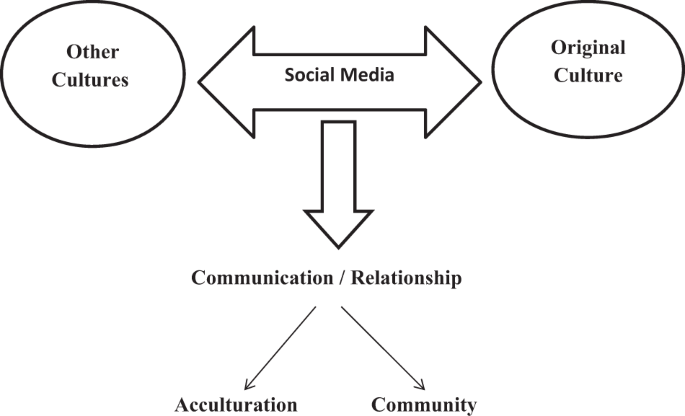Social media has become a significant force in shaping cultural narratives, impacting how individuals and societies communicate, express identities, and negotiate their cultural values. As technological platforms facilitate global connectivity, they also contribute to the evolution of cultural expressions and engagement, presenting both opportunities and challenges.
Reinforcement and Transformation of Identity
Social media platforms serve as important spaces for identity exploration and development, particularly among adolescents. This demographic finds in social networks a venue for experimenting with various identities, often in an anonymous context, allowing for a significant degree of self-exploration. However, this environment can also complicate identity formation, as the pressure to conform to social norms and expectations can lead to fragmented self-representations that differ from one’s authentic self. For instance, individuals may present carefully crafted images that are more in line with social validation rather than their genuine identities, resulting in a narrow expressions of self that inhibit deeper self-discovery and acceptance[2][5].
Moreover, the dynamics of identity formation on platforms like Twitter illustrate how notions of cultural identity are not only constructed but also contested. A recent study highlights the role of responses to events, such as the COVID-19 pandemic, in shaping nationalistic discourses online. These discussions often reflect a combination of emotional (feeling), behavioral (action), and identity-related elements, showing how social media influences and mediates public perception and cultural narratives during crises[6].
Social Media as a Cultural Reflection and Shaper

The interaction between social media and cultural identity is particularly evident in the context of rural populations, such as those surveyed in a study from Egypt. The findings indicate that social media usage significantly affects cultural identity components among rural villagers, with many reporting high levels of change. Participants noted shifts in their language use, community participation, and familial interactions, all influenced by their engagement with social media platforms[4].
Key components of cultural identity, such as language, social norms, and community ties, have been reshaped through the interactions facilitated by social media. For example, respondents indicated an increased use of colloquial dialects and new terms popularized through online communication, which demonstrates how social media can alter linguistic practices and interpersonal communication styles. This change suggests an erosion of traditional linguistic norms, as digital communication forms may prioritize brevity and informality[4].
Connection and Isolation Dynamics
While social media fosters connectivity and the formation of new cultural narratives through shared experiences and collective actions, it also poses risks of alienation and fragmentation. The phenomenon of “careful culture,” as described in recent analyses, points to a societal tendency towards hyper-vigilance regarding personal expression on social media. Users often feel compelled to conform to in-group norms, which can amplify divisions and inhibit meaningful dialogue across differing cultural perspectives. This carefulness in communication suggests that individuality is frequently sacrificed for social acceptance within these digital communities[2].
The impact of social media on cultural narratives includes the reinforcement of group identities, which can both unite and divide individuals based on shared characteristics or experiences. These dynamics can lead to distinct, often polarized, online communities where in-group solidarity is prioritized, while out-group identities may be disregarded or judged harshly. This reinforces stereotypes and cultural biases, complicating the landscape of cultural exchange and integration[2][3].
Implications for Cultural Understanding
The integration of social media into daily life has profound implications for how cultural narratives are transmitted and understood. As individuals increasingly interact across cultural boundaries through online platforms, there emerges a duality where social media can both bridge and widen cultural divides. While it can facilitate exposure to diverse perspectives, enabling greater empathy and understanding, it can also contribute to echo chambers that distort public perceptions of cultural identity and societal issues[3].
In contexts like the recent global health crisis, the role of social media as a platform for spreading both awareness and misinformation highlights its influence on public sentiment and identity formation. The emotions expressed in social media discussions around such topics can mirror societal anxieties and hopes, showcasing how digital interactions can reflect broader cultural narratives while also shaping future societal norms[6].
Conclusion
In conclusion, social media serves as a powerful catalyst in the development and transformation of cultural narratives. It facilitates identity exploration and fosters connections among diverse individuals, yet it also reinforces divisions and challenges the authenticity of cultural expression. As social media continues to evolve, understanding its impact on cultural identity and narratives will be crucial for navigating the complexities of communication in an increasingly interconnected world. Future research will need to explore these dynamics further to comprehend how social media can be harnessed for positive cultural exchange while mitigating its potential for fragmentation and misunderstanding.
Get more accurate answers with Super Pandi, upload files, personalized discovery feed, save searches and contribute to the PandiPedia.
Let's look at alternatives:
- Modify the query.
- Start a new thread.
- Remove sources (if manually added).